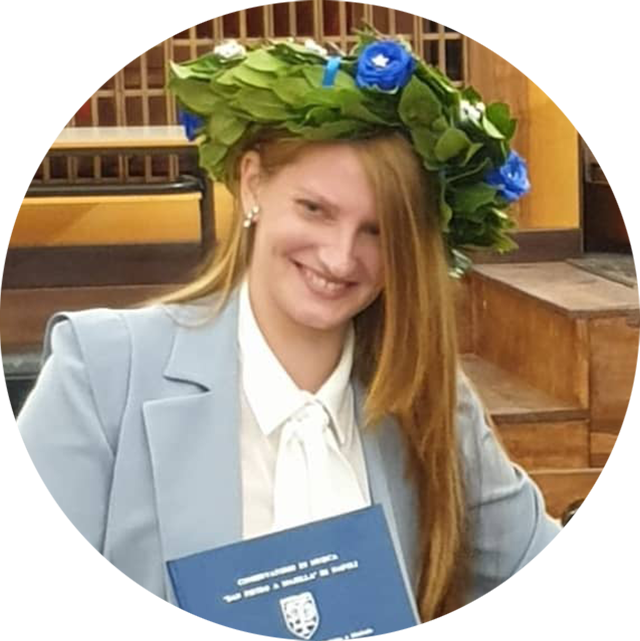Because of my hearing loss, the beginning of my musical journey can be described as a continuous pendulum between love and hate.
Table of Contents
Music and Deafness
I have been deaf since birth, but it wasn’t until the age of four that it was discovered. Thanks to the team of audiologists at the Policlinico Federico II in Naples, led by Dr. Auletta, I was diagnosed with severe bilateral sensorineural hearing loss. I was fit immediately with Phonak hearing aids and attended speech therapy for seven years.
At first, the hearing aids were sufficient. My life was like that of a person with normal hearing. I was a very active child with a lot of zest for life. I played many sports, including volleyball, figure skating, fit-combat, beat boxing, yoga, karate, and my absolute favorite, swimming. But I had one small problem—socialization. I used my mother as a conduit to communicate with the world. Maybe out of fear, or shyness, or because my mom let me, I always hid behind her and shut myself away. When I was 11, a routine check-up confirmed that my hearing loss had gotten worse, and that I was now a candidate for cochlear implantation.
Finding my passion
At around the same time, however, I discovered my love for music, especially piano music, thanks to Maestro Vitali. I am not good with words, and music allows me to express myself and my emotions. I have since realized that that this is my calling—to convey emotion through music. But because of my hearing loss, the beginning of my musical journey can be described as a continuous pendulum between love and hate.
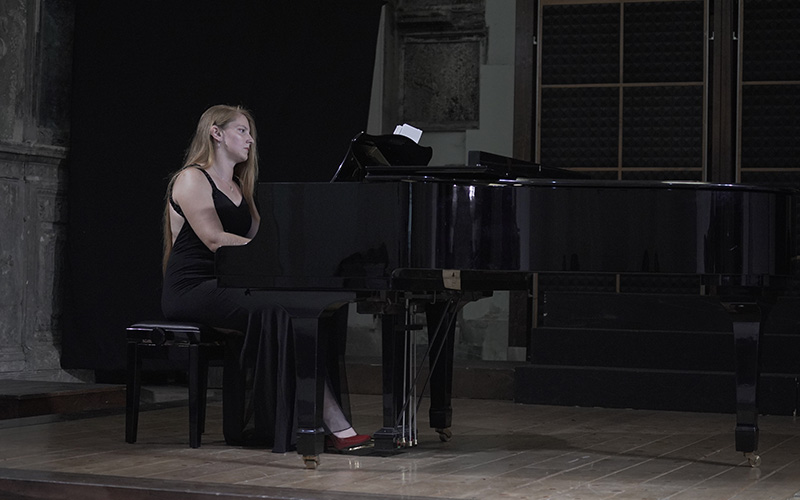
I was still able to hear with my hearing aids until my eighteenth birthday. Even though my hearing thresholds were getting worse and worse, I still didn’t want to consider cochlear implants. I was afraid that I would not be able to identify and discriminate the finer nuances of music with a CI. I wanted to pursue my dream of becoming a musician, but the hearing aids had their limitations. I could hear the low notes perfectly well up to the middle part of the keyboard, but I never heard the high notes. And the last octaves of the piano bothered me a lot.
Despite all this, I went to a music high school. I was having a lot of difficulties, and many of the high-pitched instruments, such as the violin and the flute, were hard for me to master. But I managed to finish high school with very good grades, and was admitted to the San Pietro a Majella Conservatory of Music in Naples. At the conservatory, I realized more and more that the exams required skills that were impossible for me, such as ear training, piano accompaniment for other instruments or singers, and note intonation.
Hitting bottom
Furthermore, by the second year of university, I lost even more hearing in my left ear. I also start having tinnitus. Which heralded the beginning of a period of suffering, loneliness, nervousness, and insomnia.
There is typically no cure for tinnitus, but thanks to my audiologists Dr. Lauritano and Dr. Capoluongo at Audiolux, a solution was found. I was advised to listen to instrumental music without words at a lower volume than the tinnitus and pay attention only to it while ignoring the tinnitus.
This at least helped me to sleep, but otherwise, I locked myself in my room alone with my cell phone and television. I gave up the conservatory and the piano. It was during this time that I started thinking about the operation again. I thought that perhaps cochlear implants were the only way for me to take my life back from the hearing loss and tinnitus. But I was very afraid.
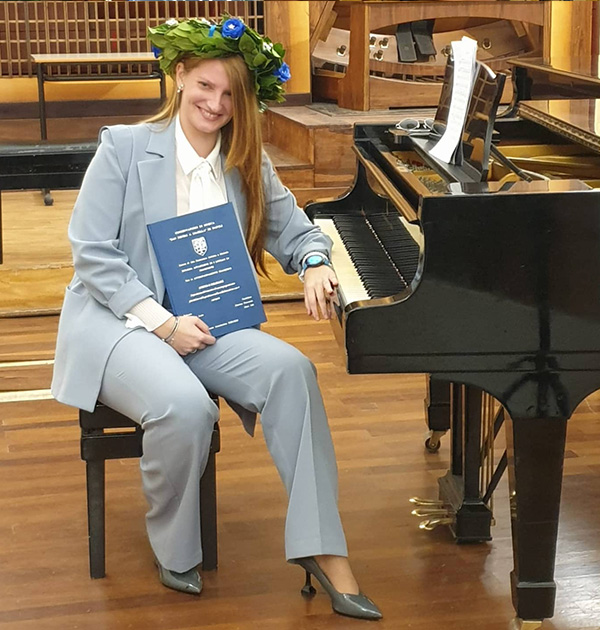
Candidacy tests during the process showed that my hearing loss is actually caused by Pendred Syndrome.
In September 2018, I finally decided to take the leap and go for the implant surgery. Candidacy tests during the process showed that my hearing loss is actually caused by Pendred Syndrome, which is characterized by the presence of an enlarged vestibular aqueduct and progressive hearing loss.
Hearing with a cochlear implant
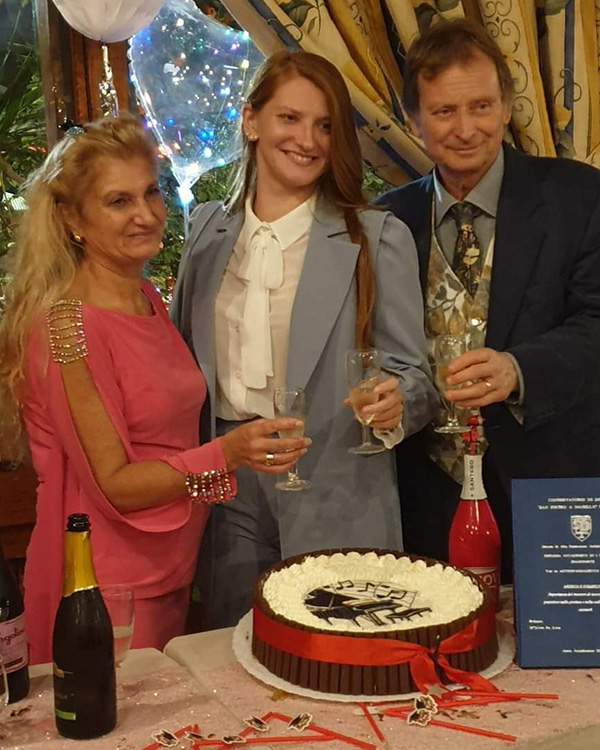
On February 28, 2019, I had my CI surgery at Cisanello Hospital in Pisa by Dr. Berrettini for my worse ear, which is the left. I chose Advanced Bionics together with my doctor because AB’s CIs are designed to work together with Phonak hearing aids, the ones I have always used. We felt that being used to the Phonak sound, especially for music, would also help me adapt quicker to the CI from AB. We also like that the T-mic, which is placed at the opening the ear, would enable a more natural perception of sound. I’m a lover of the sea, so the waterproof solutions from AB would give me the possibility to swim and still hear everything else when I’m in or near water, which wasn’t possible before with the hearing aid.
After the surgery, my switch-on appointment was a disappointment. Everything sounded electronic and staticky like the Transformers movie. It was really hard having to accept such a radical change in my sound perception. I tried to listen to music, but it also sounded totally mechanical. I became even more demoralized and convinced that I would not be able to continue my musical studies.
Time, however, is transformative. In just three months, I was able to achieve 100% in speech understanding, even in noise. I could recognize consonants such as F, V, S, C, G, Z—sounds that I could not hear before with hearing aids. I no longer resort to lip reading. I can hear speech coming from another room, and over the phone.
The AB cochlear implant has enabled me to do everything that I previously thought was impossible.
But my main goal was to be able to get closer to music again and to complete my studies. Because I have a bimodal system, my CI allows me to hear the high pitches, while the hearing aid on the other ear amplifies the lows. It took me a long time to get used to this with music perception, because the sounds coming from the devices are very different.
Pursuing my passion
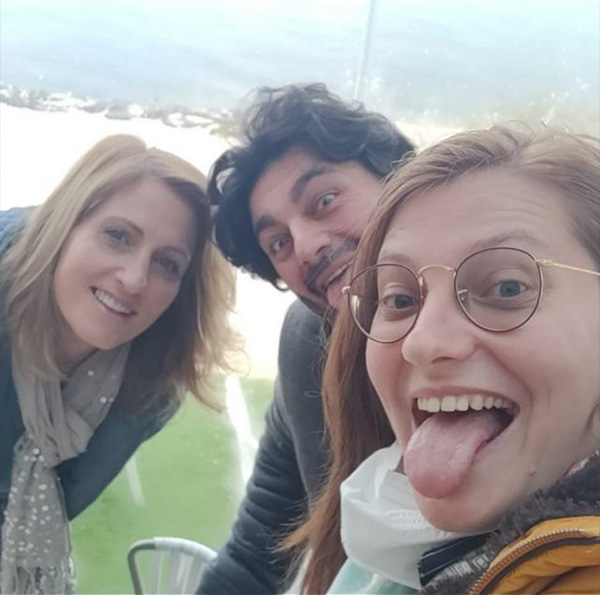
But in November 2019, I finally felt confident enough in my hearing to re-enroll in the conservatory. And this time, I can finally play the other instruments. I can listen to the orchestra without problems, so much so that I can recognize which instrument comes in later than the ensemble. I can hear the nuances of sound from fortissimo to pianissimo. I recognize notes without problems. I can accompany singers. In short, the AB cochlear implant has enabled me to do everything that I previously thought was impossible.
With great dedication and perseverance, despite the pandemic and online classes, I managed to graduate in November 2021 from the three-year piano program. The title of my thesis was Music and Disability. I even participated in several events and competitions, including Pianocity in Naples, where the audience praised me for my charisma and musical sensitivity. Recently, at the same conservatory, I was admitted with honors to the two-year piano master class with a solo focus, as my dream is to become a professional performing pianist with an international career.
I want to use my story to leave a message and to encourage others. My advice for all those who want to take any path in life is not to stop in front of a giant problem such as deafness, operation, etc. There are solutions that can allow you to live life peacefully and enjoy it to the fullest. Nothing is impossible if you really want it. I am a living testimony of this. Despite so many difficulties, even serious ones, I have managed to go on. Nothing can extinguish my dreams. I hope that in the future, I can perform concerts so I can spread my message that deafness should not be seen as an insurmountable problem in achieving goals.
